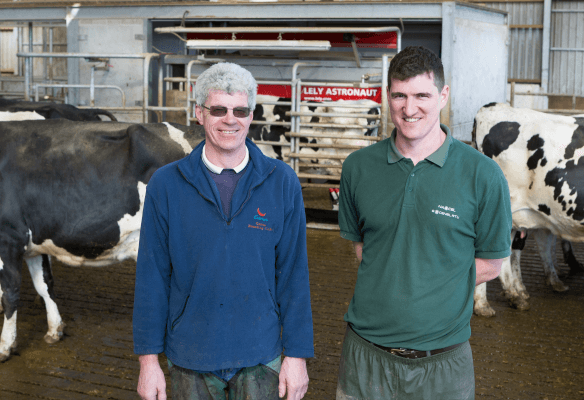
Farmer Focus: Stephen & Neil Brough
Stephen Brough and son Neil run their mixed herd enterprise at Buckabank Farm in Cumbria. Spread over 560 acres, they have 320 Holstein dairy cattle under prefix Carrock, 240 Texel sheep and 15 beef cattle.
The dairy herd is run on an all-year-round calving system with the cows milked through a robotic milking parlour which was installed in 2015. The herd’s diet is based on a TMR and all the cows are fully housed.
The farm utilises a range of CIS services including milk testing, health testing, Mobile Herd and the YourHerd web-based management system.
Commenting on the services offered by CIS, Stephen says; “As the farm is in a CHeCS health scheme, the health testing service is extremely valuable to our business – particularly the Johne’s testing. This service helps us to monitor and measure herd health and ultimately performance and assists us in making informed decisions about the best processes to implement when trying to eradicate a disease. Mobile Herd is also a useful tool; having information to hand, remotely, whilst out on the farm or when the vet visits, it really helps with time and labour efficiency – as well as data accuracy.”
“Whilst a brave move at the time, the Lely robotic system that we adopted two years ago has been hugely beneficial. We’ve seen an improvement to herd health, well-being, fertility and performance. With the milk price picking up we will look to expand with more robots moving forwards.”
Stephen concludes; “The future for the dairy industry is bright. We’ve been through tough times – but we must look forward with positivity. The dairy industry is one of the most innovative sectors and has openly embraced new technology, genetics, and ideas, and will continue to do so moving forwards. Whilst it is inevitable that we’ll lose some smaller producers and larger ones will expand further, our focus should be on working with processors to strengthen the supply chain and deliver on exactly what the market wants. On farm, I see genomic testing becoming the norm because knowing what not to breed off is what is important and this will help with future herd performance.”
